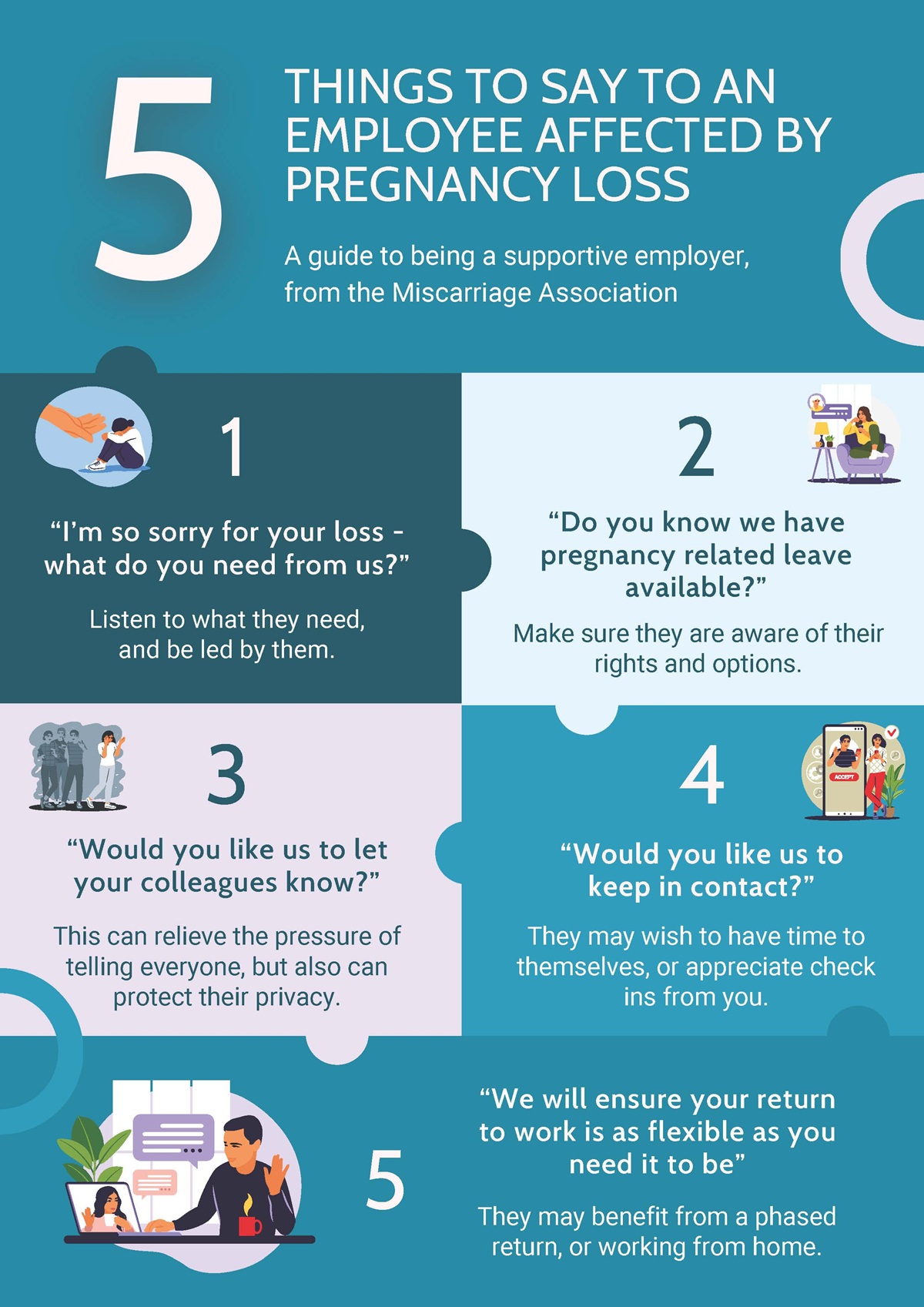How can schools support staff affected by pregnancy loss?
It can be difficult to know how to best support a member of staff who has been affected by pregnancy loss. Here is some guidance from The Miscarriage Association on how to ensure you’re providing the support they need.
Articles / 3 mins read

It can be difficult to know how to best support a member of staff who has been affected by pregnancy loss. There is often a worry of blurring the lines between personal and professional, or that bringing up their experience may be triggering for them.
The important thing to remember is that everyone deals with their experiences of pregnancy loss differently, so there is no ‘one size fits all’ approach to support that will suit every staff member. However, acknowledging what they have been through, and letting them know you’re there for them is really important.
With this in mind, here is some guidance from The Miscarriage Association on how to ensure you’re providing the support they need:
1. Make sure support is there from the start
There’s nothing worse than feeling unprepared, and on the back foot – so it’s best to get started now. Ensure your management teams have gone through awareness training and are equipped with the skills to support members of staff through these difficult times. Also ensure your policies that include pregnancy loss, be this a separate policy or enveloped in a more general policy, are inclusive, sympathetic, and able to cater to different people’s needs. Take a look at our best practice for creating a miscarriage policy.
2. Take their lead
Everyone will experience their pregnancy loss differently. The best approach is to mirror their terminology and not make assumptions about how they feel. If they refer to their pregnancy loss as their baby, use the term baby or baby loss. Equally, if they use phrases like ‘my miscarriage’ or ‘my loss’, echo this in your conversations. You might say: “I’m so sorry for your loss - what do you need from us?” Then listen to what they need and be led by them.
3. Handle disclosures with compassion, discretion and sensitivity
This conversation will very likely be much harder for them than it is for you, so being kind and listening to how they feel is crucial. It’s important that they feel heard, and that you address their concerns, logistical worries, and emotions that may come up during or after your meeting. Our 5 things to say to an employee affected by pregnancy loss offers some quick, easy to remember phrases. I really like this graphic – is there a way to display it on the webpage or wondering if we can share on socials?
4. Check in and respond to their needs
Unless they state otherwise, check in regularly to see how your staff member is getting on. It can feel difficult for staff to reach out to work, especially when they are going through something like pregnancy loss. Being proactive about getting in touch and showing you care can be really appreciated. It also gives them a chance to settle any worries or concerns they have about work, especially if they choose to take some time off. If they would rather not be contacted, make sure you respect their boundaries.
5. Be flexible when they return to work
Returning back to work after pregnancy loss can be incredibly difficult. Pregnancy loss can create a grief for the child they could have had, so coming back to a workplace with children may be triggering. When your staff member is ready to return to work, ask them how it can be made easier, such as organising a phased return. Once they’ve returned, make sure you check in to see how they are doing in a ‘return to work’ meeting. You may want to create a Wellness Action Plan together, with ongoing support. However, have in mind that the things that might be helpful may change as they settle back in - being adaptable to the needs and wellbeing of your staff is crucial.
6. Know that even when they seem better, there may still be bad days
Grief, physical and emotional recovery are not linear. Just because your staff member may seem to be improving, this doesn’t mean they won’t have bad days, be triggered, or need some time in the future. Everyone is different, but some may feel their loss all over again later down the line – on their would-be due date, or if another staff member announces a pregnancy, for example.
There are many ways to support your staff after their pregnancy loss – but being supportive doesn’t end when they’re back and settled in. It’s important to create a culture of flexibility, support, and compassion, so that staff feel able to disclose their losses (should they wish to) and access the support they need. Support, like the advice listed above, doesn’t end when a staff member has returned to work and settled back in. It’s an ongoing, ever-evolving process, which can be tailored to suit the needs of individuals. Every pregnancy loss is different, much like every person is different.
It can be hard to know where to start when looking for resources to help you upskill your staff and improve your policies. The Miscarriage Association offers training packages, policy guidance and templates, and useful resources on their workplace resource hub.
If you have been affected by pregnancy loss, and are struggling, you can contact the Miscarriage Association helpline by calling 01924 200799, email info@miscarriageassociation.org.uk or starting a live chat on their website.
And don’t forget Education Support’s emotional support helpline is available 24/7, for anything you are struggling with at work or home. Call day or night on 08000 562 561.

Don’t wait for a crisis to call.
We’ll offer you immediate, emotional support.
08000 562 561

Sign up to our newsletter for the latest mental heath and wellbeing resources, news and events straight to your inbox.





















